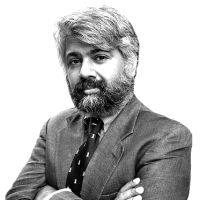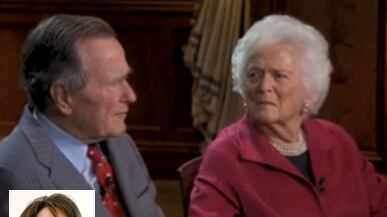Two stout old biddies got stuck into Sarah Palin this weekend—Barbara Bush and Frank Rich.
Barbara Bush was Barbara Bush. Haughty, blunt, laconic, and accustomed to the perks that come with power, she offered this put-down of Palin on Larry King’s TV show: “I sat next to her once. She was beautiful. And I think she’s very happy in Alaska… and I hope she’ll stay there.”
Frank Rich was Frank Rich: Waxing apoplectic in his vast op-ed sanctuary at The New York Times, he wrung his hands, reached for his metaphors, rolled his eyes, and preached to the nation (with the relentless omniscience that is his hallmark) on the Perils of Palin. The two pillars of Establishment—the Republican and the liberal Democrat—put on display an amazing phenomenon of American political life: Palin Paranoia. There is no politician in America as adept at disconcerting the elites as Sarah Palin.
My task is to ask why Sarah Palin so disturbs people.
What follows is a thread of thought, offered neither in support of her nor as criticism: It is an attempt, instead, to get at some answers.
Sarah Palin’s political success has come in such a way as to seem like a rebuke to those who have worked hard to get where they are.
Typically, politicians who strut like peacocks on the national stage value experience, temperamental restraint (or constraint), knowledge, and dues-paying. Palin seems to be profiting from qualities—spontaneity, you-betcha folksiness, an anti-sophistication about issues, and, let’s face it, striking good looks—that the elite don’t have, and don’t easily endorse.
• Meghan McCain: Palin’s Media Strategy• Shushannah Walshe: The Legal Brawl Over Palin’s Book• Palin’s Handbook for 2012Many people (on both right and left) are genuinely made nervous by her potential for populism, even demagoguery. The demotic self-deprecation barely masks a vast ambition, which is a kind of deception in itself, or an artifice. She is, ultimately, a creature so without precedent in our politics that people like Frank Rich have just lost their bearings. Hers is the politics of the ward writ large on a national stage—a species of federal macro-narcissism that has been fueled by the media, to which body Palin dances a dance of defiance and riposte, even as her daughter cha-chas on the inexplicably popular TV show Dancing With the Stars. To those who abhor the mainstream media—and this cohort would include many in Middle America—this defiance is laudable, even heroic. To the media itself, this defiance is catnip.
To the matter of her appearance: There is no question that her seasoned beauty and vivacity are ingredients in the Palin cocktail.
This must, surely, bother the likes of Frank Rich and Barbara Bush. To the former, it likely evokes Eva Peron, another beautiful populist, and the evocation can only be distasteful, what with the faintly Third World whiff of it all.
Palin has “star power,” the real thing, rather like Ronald Reagan or Princess Diana did (and Bill Clinton, on a good day, still does). It is what Paul Newman had when the camera lingered on him: It didn’t matter whether he was acting particularly well. It is a quality that causes people to sit up and take notice—and even to feel a bond.
“Substance,” here, is beside the point, and this enrages a certain spectrum of the intelligentsia. As for Barbara Bush, her husband had not one iota of star power; her son had a little, but his qualities—non-eloquence, an Everyman outlook, a red-state appeal—are Sarah Palin’s, too… a closeness that may embarrass Barbara Bush more than a little, and really sting.
Another source of consternation may be more philosophical. We have in this country a still-revered notion—one that barely survived, on the left, the first election of George W. Bush—that democracy ultimately filters correctly, that there is a sort of democratic “invisible hand” that weds person and power suitably and has an in-built capacity for self-correction. If American democracy is inherently reliable, how could it be that Palin is a serious contender for the nation’s top job, or at least for the Republican nomination for 2012? Wouldn’t that outcome throw the whole process into doubt?
There are some who would applaud that. As many have observed, there is a kind of revolution-mood afoot: Out with the elites! Overturn! Upend! So the emergence of Sarah Palin—a candidate not qualified by the conventional terms of American high office—makes the political upending more triumphal, and somehow more total.
But the truth is that Palin disconcerts us because she seems to have no mask at all, no change of gear. She’s utterly forthcoming, even regarding her family, which is normally a sacred preserve of privacy. Perhaps it’s frightening to meet such people for those of us who value propriety and discretion first of all. So we don’t like her because we are afraid of that level of openness. It just terrifies us. Could we endure a president who is mask-less?

In sum, Palin has an attraction that many people cannot fathom. She did earn her way up a political ladder in Alaska, but that is below the broader radar for most. She is not to the manor born, not having met her husband at an Andover dance. Also: She has not ever been a theater critic, unlike Frank Rich—although I wouldn’t draw from that the conclusion, as Rich does, that she disdains educated people.
She did earn her way up a political ladder in Alaska, but that is below the broader radar for most. She is not to the manor born, not having met her husband at an Andover dance.
Since Palin’s political attraction isn’t immediately comprehensible to the ruling class, she terrifies that class, for whom there is no torture worse than not being able to comprehend. I’m convinced that her run for the presidency is her way of baiting these people—her enemies.
In effect, she’s a strong, beautiful, ungovernable woman who is scaring the pants off a whole lot of people—scaring the pants, to be sure, off Frank Rich, and off dear old Barbara Bush.
Tunku Varadarajan is a national affairs correspondent and writer at large for The Daily Beast. He is also the Virginia Hobbs Carpenter Fellow in Journalism at Stanford's Hoover Institution and a professor at NYU's Stern Business School. He is a former assistant managing editor at The Wall Street Journal. (Follow him on Twitter here.)





